Attached files
| file | filename |
|---|---|
| 8-K - 8-K - MVB FINANCIAL CORP | form8krestatedbylaws-061918.htm |
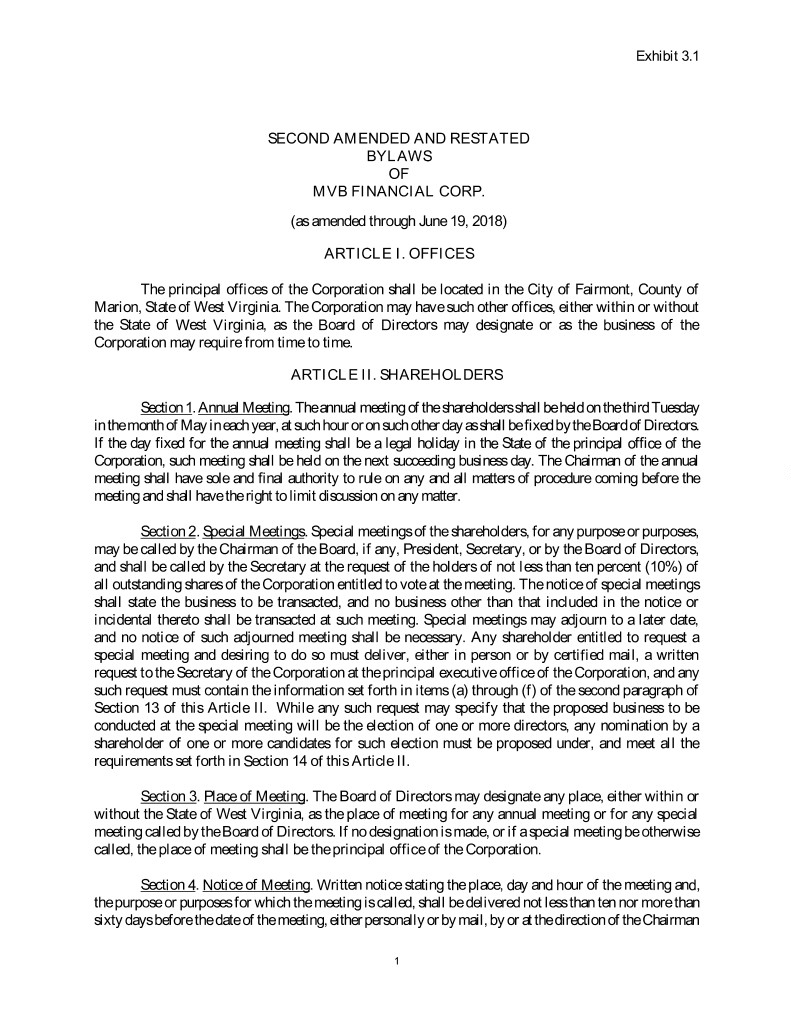
Exhibit 3.1 SECOND AMENDED AND RESTATED BYLAWS OF MVB FINANCIAL CORP. (as amended through June 19, 2018) ARTICLE I. OFFICES The principal offices of the Corporation shall be located in the City of Fairmont, County of Marion, State of West Virginia. The Corporation may have such other offices, either within or without the State of West Virginia, as the Board of Directors may designate or as the business of the Corporation may require from time to time. ARTICLE II. SHAREHOLDERS Section 1. Annual Meeting. The annual meeting of the shareholders shall be held on the third Tuesday in the month of May in each year, at such hour or on such other day as shall be fixed by the Board of Directors. If the day fixed for the annual meeting shall be a legal holiday in the State of the principal office of the Corporation, such meeting shall be held on the next succeeding business day. The Chairman of the annual meeting shall have sole and final authority to rule on any and all matters of procedure coming before the meeting and shall have the right to limit discussion on any matter. Section 2. Special Meetings. Special meetings of the shareholders, for any purpose or purposes, may be called by the Chairman of the Board, if any, President, Secretary, or by the Board of Directors, and shall be called by the Secretary at the request of the holders of not less than ten percent (10%) of all outstanding shares of the Corporation entitled to vote at the meeting. The notice of special meetings shall state the business to be transacted, and no business other than that included in the notice or incidental thereto shall be transacted at such meeting. Special meetings may adjourn to a later date, and no notice of such adjourned meeting shall be necessary. Any shareholder entitled to request a special meeting and desiring to do so must deliver, either in person or by certified mail, a written request to the Secretary of the Corporation at the principal executive office of the Corporation, and any such request must contain the information set forth in items (a) through (f) of the second paragraph of Section 13 of this Article II. While any such request may specify that the proposed business to be conducted at the special meeting will be the election of one or more directors, any nomination by a shareholder of one or more candidates for such election must be proposed under, and meet all the requirements set forth in Section 14 of this Article II. Section 3. Place of Meeting. The Board of Directors may designate any place, either within or without the State of West Virginia, as the place of meeting for any annual meeting or for any special meeting called by the Board of Directors. If no designation is made, or if a special meeting be otherwise called, the place of meeting shall be the principal office of the Corporation. Section 4. Notice of Meeting. Written notice stating the place, day and hour of the meeting and, the purpose or purposes for which the meeting is called, shall be delivered not less than ten nor more than sixty days before the date of the meeting, either personally or by mail, by or at the direction of the Chairman 1
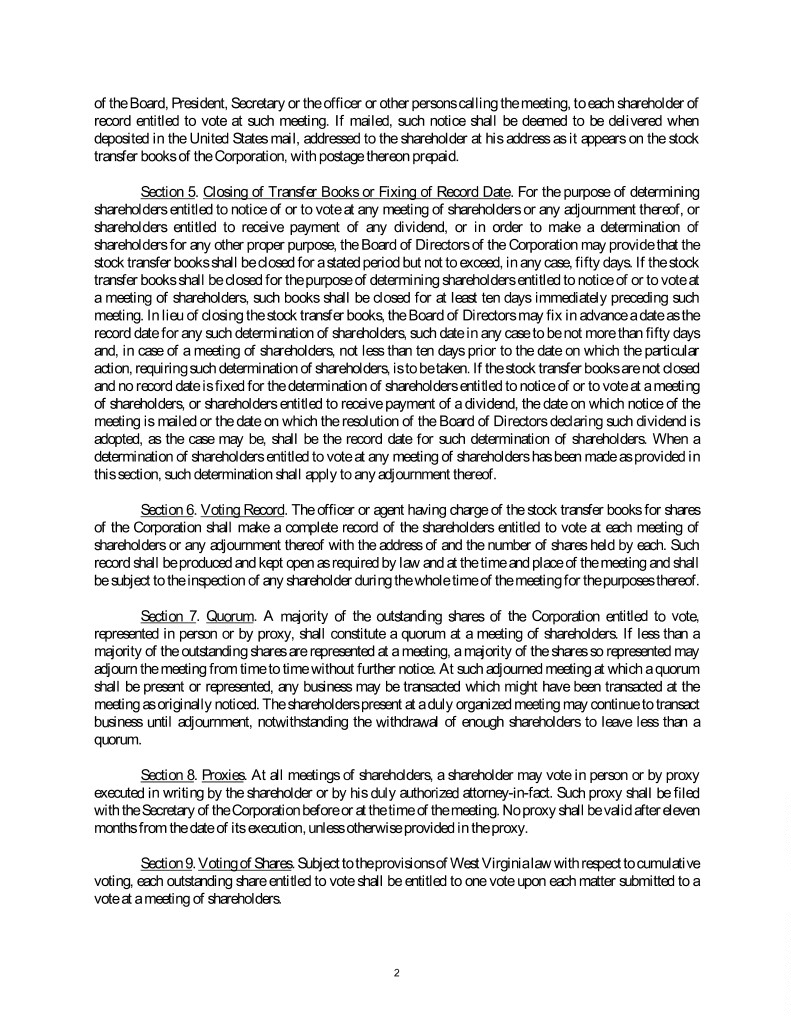
of the Board, President, Secretary or the officer or other persons calling the meeting, to each shareholder of record entitled to vote at such meeting. If mailed, such notice shall be deemed to be delivered when deposited in the United States mail, addressed to the shareholder at his address as it appears on the stock transfer books of the Corporation, with postage thereon prepaid. Section 5. Closing of Transfer Books or Fixing of Record Date. For the purpose of determining shareholders entitled to notice of or to vote at any meeting of shareholders or any adjournment thereof, or shareholders entitled to receive payment of any dividend, or in order to make a determination of shareholders for any other proper purpose, the Board of Directors of the Corporation may provide that the stock transfer books shall be closed for a stated period but not to exceed, in any case, fifty days. If the stock transfer books shall be closed for the purpose of determining shareholders entitled to notice of or to vote at a meeting of shareholders, such books shall be closed for at least ten days immediately preceding such meeting. In lieu of closing the stock transfer books, the Board of Directors may fix in advance a date as the record date for any such determination of shareholders, such date in any case to be not more than fifty days and, in case of a meeting of shareholders, not less than ten days prior to the date on which the particular action, requiring such determination of shareholders, is to be taken. If the stock transfer books are not closed and no record date is fixed for the determination of shareholders entitled to notice of or to vote at a meeting of shareholders, or shareholders entitled to receive payment of a dividend, the date on which notice of the meeting is mailed or the date on which the resolution of the Board of Directors declaring such dividend is adopted, as the case may be, shall be the record date for such determination of shareholders. When a determination of shareholders entitled to vote at any meeting of shareholders has been made as provided in this section, such determination shall apply to any adjournment thereof. Section 6. Voting Record. The officer or agent having charge of the stock transfer books for shares of the Corporation shall make a complete record of the shareholders entitled to vote at each meeting of shareholders or any adjournment thereof with the address of and the number of shares held by each. Such record shall be produced and kept open as required by law and at the time and place of the meeting and shall be subject to the inspection of any shareholder during the whole time of the meeting for the purposes thereof. Section 7. Quorum. A majority of the outstanding shares of the Corporation entitled to vote, represented in person or by proxy, shall constitute a quorum at a meeting of shareholders. If less than a majority of the outstanding shares are represented at a meeting, a majority of the shares so represented may adjourn the meeting from time to time without further notice. At such adjourned meeting at which a quorum shall be present or represented, any business may be transacted which might have been transacted at the meeting as originally noticed. The shareholders present at a duly organized meeting may continue to transact business until adjournment, notwithstanding the withdrawal of enough shareholders to leave less than a quorum. Section 8. Proxies. At all meetings of shareholders, a shareholder may vote in person or by proxy executed in writing by the shareholder or by his duly authorized attorney-in-fact. Such proxy shall be filed with the Secretary of the Corporation before or at the time of the meeting. No proxy shall be valid after eleven months from the date of its execution, unless otherwise provided in the proxy. Section 9. Voting of Shares. Subject to the provisions of West Virginia law with respect to cumulative voting, each outstanding share entitled to vote shall be entitled to one vote upon each matter submitted to a vote at a meeting of shareholders. 2
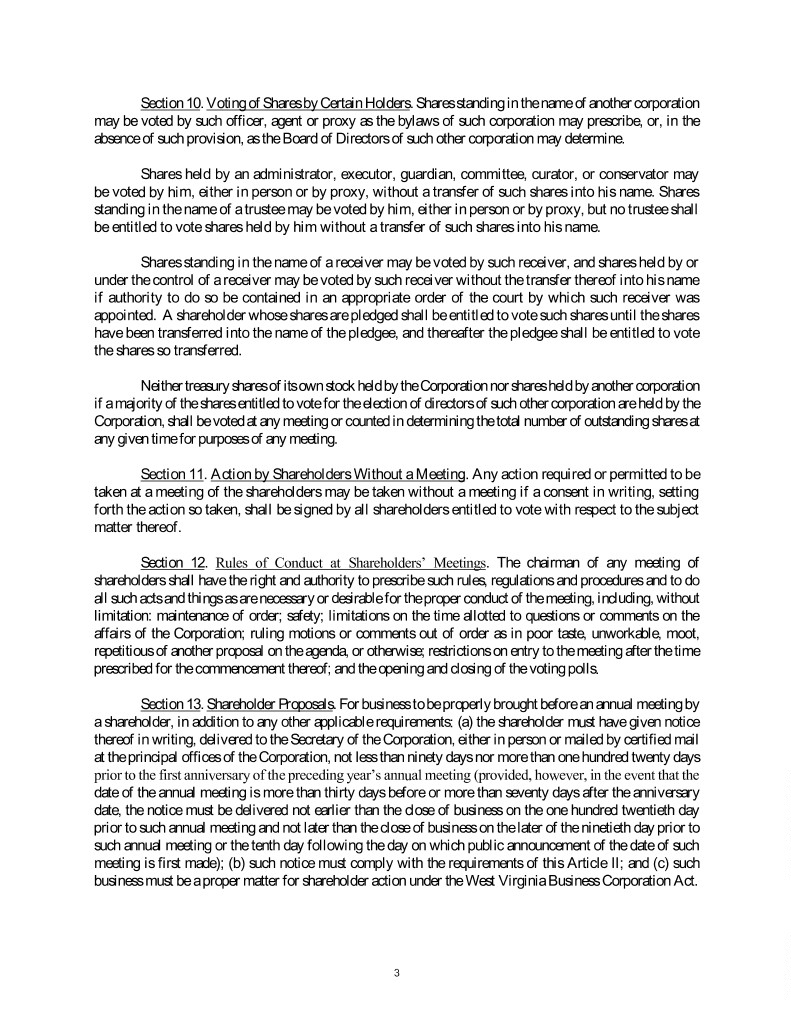
Section 10. Voting of Shares by Certain Holders. Shares standing in the name of another corporation may be voted by such officer, agent or proxy as the bylaws of such corporation may prescribe, or, in the absence of such provision, as the Board of Directors of such other corporation may determine. Shares held by an administrator, executor, guardian, committee, curator, or conservator may be voted by him, either in person or by proxy, without a transfer of such shares into his name. Shares standing in the name of a trustee may be voted by him, either in person or by proxy, but no trustee shall be entitled to vote shares held by him without a transfer of such shares into his name. Shares standing in the name of a receiver may be voted by such receiver, and shares held by or under the control of a receiver may be voted by such receiver without the transfer thereof into his name if authority to do so be contained in an appropriate order of the court by which such receiver was appointed. A shareholder whose shares are pledged shall be entitled to vote such shares until the shares have been transferred into the name of the pledgee, and thereafter the pledgee shall be entitled to vote the shares so transferred. Neither treasury shares of its own stock held by the Corporation nor shares held by another corporation if a majority of the shares entitled to vote for the election of directors of such other corporation are held by the Corporation, shall be voted at any meeting or counted in determining the total number of outstanding shares at any given time for purposes of any meeting. Section 11. Action by Shareholders Without a Meeting. Any action required or permitted to be taken at a meeting of the shareholders may be taken without a meeting if a consent in writing, setting forth the action so taken, shall be signed by all shareholders entitled to vote with respect to the subject matter thereof. Section 12. Rules of Conduct at Shareholders’ Meetings. The chairman of any meeting of shareholders shall have the right and authority to prescribe such rules, regulations and procedures and to do all such acts and things as are necessary or desirable for the proper conduct of the meeting, including, without limitation: maintenance of order; safety; limitations on the time allotted to questions or comments on the affairs of the Corporation; ruling motions or comments out of order as in poor taste, unworkable, moot, repetitious of another proposal on the agenda, or otherwise; restrictions on entry to the meeting after the time prescribed for the commencement thereof; and the opening and closing of the voting polls. Section 13. Shareholder Proposals. For business to be properly brought before an annual meeting by a shareholder, in addition to any other applicable requirements: (a) the shareholder must have given notice thereof in writing, delivered to the Secretary of the Corporation, either in person or mailed by certified mail at the principal offices of the Corporation, not less than ninety days nor more than one hundred twenty days prior to the first anniversary of the preceding year’s annual meeting (provided, however, in the event that the date of the annual meeting is more than thirty days before or more than seventy days after the anniversary date, the notice must be delivered not earlier than the close of business on the one hundred twentieth day prior to such annual meeting and not later than the close of business on the later of the ninetieth day prior to such annual meeting or the tenth day following the day on which public announcement of the date of such meeting is first made); (b) such notice must comply with the requirements of this Article II; and (c) such business must be a proper matter for shareholder action under the West Virginia Business Corporation Act. 3
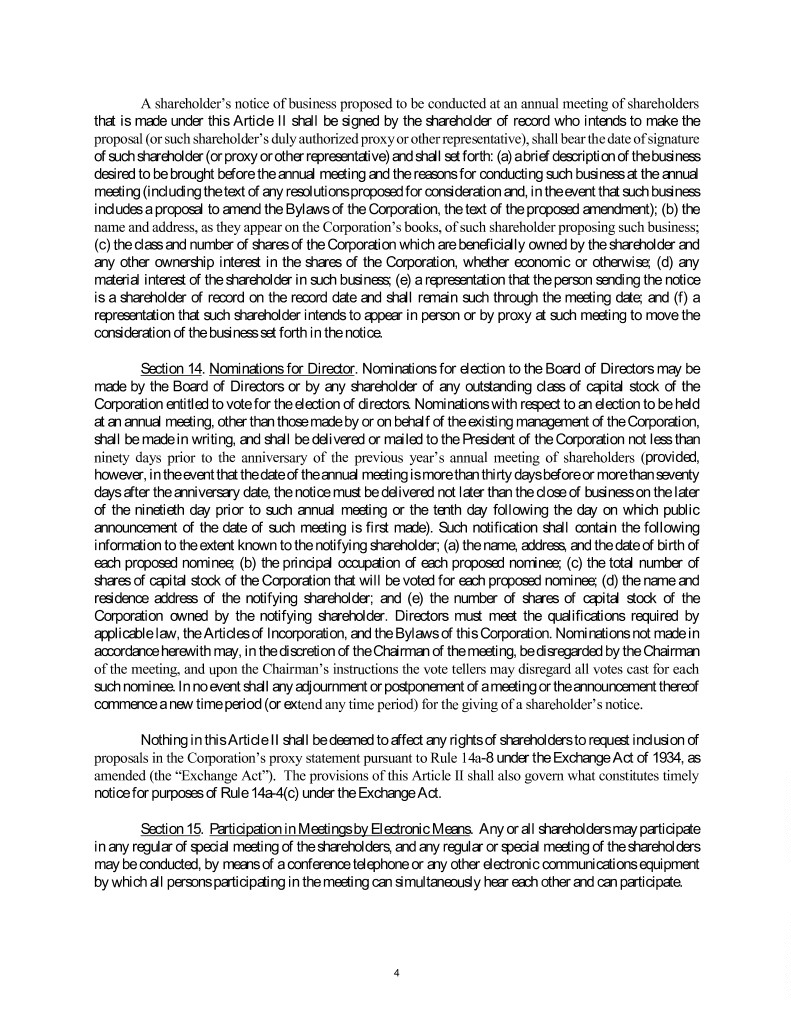
A shareholder’s notice of business proposed to be conducted at an annual meeting of shareholders that is made under this Article II shall be signed by the shareholder of record who intends to make the proposal (or such shareholder’s duly authorized proxy or other representative), shall bear the date of signature of such shareholder (or proxy or other representative) and shall set forth: (a) a brief description of the business desired to be brought before the annual meeting and the reasons for conducting such business at the annual meeting (including the text of any resolutions proposed for consideration and, in the event that such business includes a proposal to amend the Bylaws of the Corporation, the text of the proposed amendment); (b) the name and address, as they appear on the Corporation’s books, of such shareholder proposing such business; (c) the class and number of shares of the Corporation which are beneficially owned by the shareholder and any other ownership interest in the shares of the Corporation, whether economic or otherwise; (d) any material interest of the shareholder in such business; (e) a representation that the person sending the notice is a shareholder of record on the record date and shall remain such through the meeting date; and (f) a representation that such shareholder intends to appear in person or by proxy at such meeting to move the consideration of the business set forth in the notice. Section 14. Nominations for Director. Nominations for election to the Board of Directors may be made by the Board of Directors or by any shareholder of any outstanding class of capital stock of the Corporation entitled to vote for the election of directors. Nominations with respect to an election to be held at an annual meeting, other than those made by or on behalf of the existing management of the Corporation, shall be made in writing, and shall be delivered or mailed to the President of the Corporation not less than ninety days prior to the anniversary of the previous year’s annual meeting of shareholders (provided, however, in the event that the date of the annual meeting is more than thirty days before or more than seventy days after the anniversary date, the notice must be delivered not later than the close of business on the later of the ninetieth day prior to such annual meeting or the tenth day following the day on which public announcement of the date of such meeting is first made). Such notification shall contain the following information to the extent known to the notifying shareholder; (a) the name, address, and the date of birth of each proposed nominee; (b) the principal occupation of each proposed nominee; (c) the total number of shares of capital stock of the Corporation that will be voted for each proposed nominee; (d) the name and residence address of the notifying shareholder; and (e) the number of shares of capital stock of the Corporation owned by the notifying shareholder. Directors must meet the qualifications required by applicable law, the Articles of Incorporation, and the Bylaws of this Corporation. Nominations not made in accordance herewith may, in the discretion of the Chairman of the meeting, be disregarded by the Chairman of the meeting, and upon the Chairman’s instructions the vote tellers may disregard all votes cast for each such nominee. In no event shall any adjournment or postponement of a meeting or the announcement thereof commence a new time period (or extend any time period) for the giving of a shareholder’s notice. Nothing in this Article II shall be deemed to affect any rights of shareholders to request inclusion of proposals in the Corporation’s proxy statement pursuant to Rule 14a-8 under the Exchange Act of 1934, as amended (the “Exchange Act”). The provisions of this Article II shall also govern what constitutes timely notice for purposes of Rule 14a-4(c) under the Exchange Act. Section 15. Participation in Meetings by Electronic Means. Any or all shareholders may participate in any regular of special meeting of the shareholders, and any regular or special meeting of the shareholders may be conducted, by means of a conference telephone or any other electronic communications equipment by which all persons participating in the meeting can simultaneously hear each other and can participate. 4
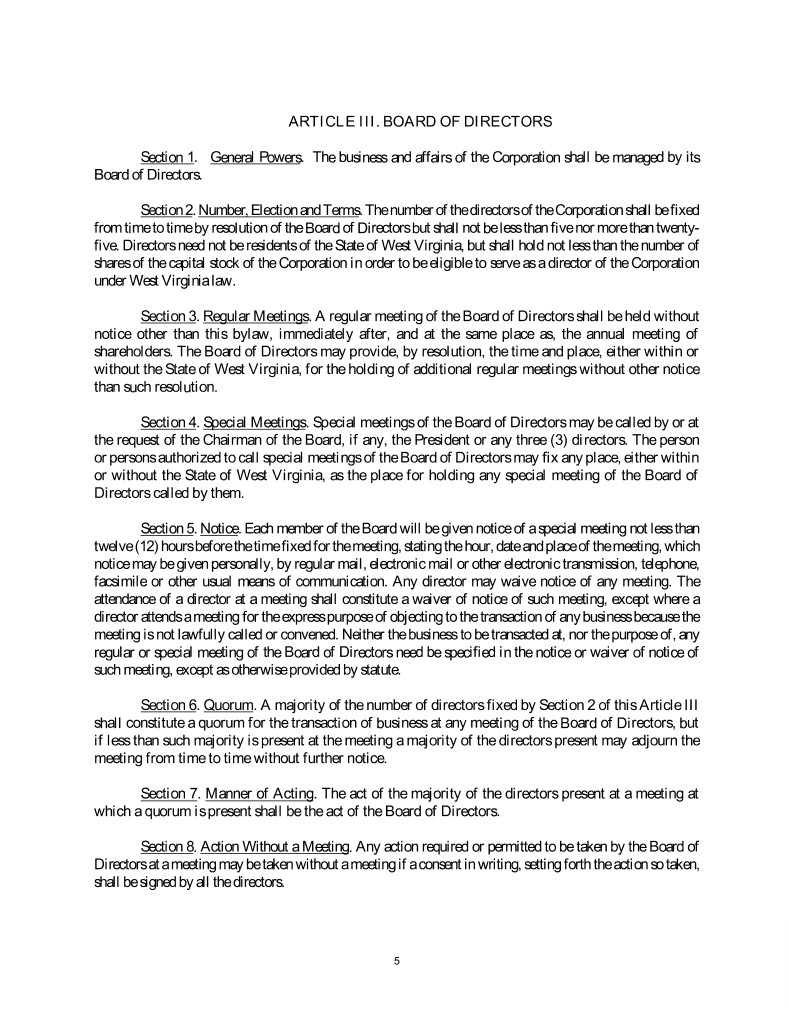
ARTICLE III. BOARD OF DIRECTORS Section 1. General Powers. The business and affairs of the Corporation shall be managed by its Board of Directors. Section 2. Number, Election and Terms. The number of the directors of the Corporation shall be fixed from time to time by resolution of the Board of Directors but shall not be less than five nor more than twenty- five. Directors need not be residents of the State of West Virginia, but shall hold not less than the number of shares of the capital stock of the Corporation in order to be eligible to serve as a director of the Corporation under West Virginia law. Section 3. Regular Meetings. A regular meeting of the Board of Directors shall be held without notice other than this bylaw, immediately after, and at the same place as, the annual meeting of shareholders. The Board of Directors may provide, by resolution, the time and place, either within or without the State of West Virginia, for the holding of additional regular meetings without other notice than such resolution. Section 4. Special Meetings. Special meetings of the Board of Directors may be called by or at the request of the Chairman of the Board, if any, the President or any three (3) directors. The person or persons authorized to call special meetings of the Board of Directors may fix any place, either within or without the State of West Virginia, as the place for holding any special meeting of the Board of Directors called by them. Section 5. Notice. Each member of the Board will be given notice of a special meeting not less than twelve (12) hours before the time fixed for the meeting, stating the hour, date and place of the meeting, which notice may be given personally, by regular mail, electronic mail or other electronic transmission, telephone, facsimile or other usual means of communication. Any director may waive notice of any meeting. The attendance of a director at a meeting shall constitute a waiver of notice of such meeting, except where a director attends a meeting for the express purpose of objecting to the transaction of any business because the meeting is not lawfully called or convened. Neither the business to be transacted at, nor the purpose of, any regular or special meeting of the Board of Directors need be specified in the notice or waiver of notice of such meeting, except as otherwise provided by statute. Section 6. Quorum. A majority of the number of directors fixed by Section 2 of this Article III shall constitute a quorum for the transaction of business at any meeting of the Board of Directors, but if less than such majority is present at the meeting a majority of the directors present may adjourn the meeting from time to time without further notice. Section 7. Manner of Acting. The act of the majority of the directors present at a meeting at which a quorum is present shall be the act of the Board of Directors. Section 8. Action Without a Meeting. Any action required or permitted to be taken by the Board of Directors at a meeting may be taken without a meeting if a consent in writing, setting forth the action so taken, shall be signed by all the directors. 5
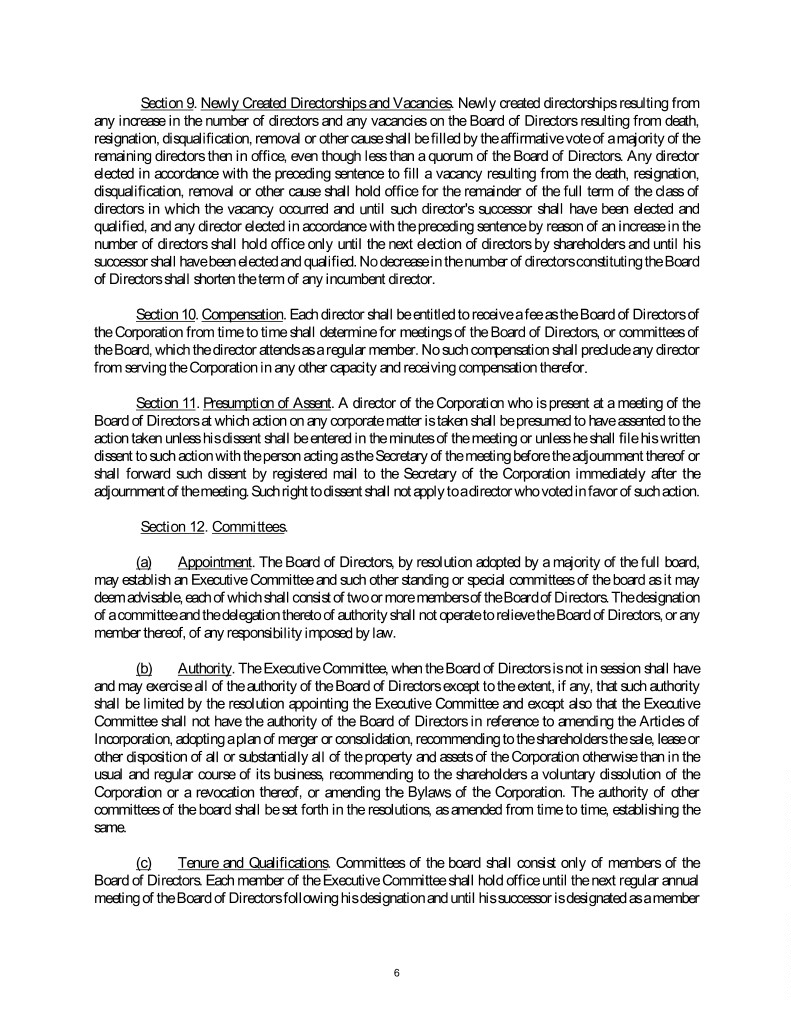
Section 9. Newly Created Directorships and Vacancies. Newly created directorships resulting from any increase in the number of directors and any vacancies on the Board of Directors resulting from death, resignation, disqualification, removal or other cause shall be filled by the affirmative vote of a majority of the remaining directors then in office, even though less than a quorum of the Board of Directors. Any director elected in accordance with the preceding sentence to fill a vacancy resulting from the death, resignation, disqualification, removal or other cause shall hold office for the remainder of the full term of the class of directors in which the vacancy occurred and until such director's successor shall have been elected and qualified, and any director elected in accordance with the preceding sentence by reason of an increase in the number of directors shall hold office only until the next election of directors by shareholders and until his successor shall have been elected and qualified. No decrease in the number of directors constituting the Board of Directors shall shorten the term of any incumbent director. Section 10. Compensation. Each director shall be entitled to receive a fee as the Board of Directors of the Corporation from time to time shall determine for meetings of the Board of Directors, or committees of the Board, which the director attends as a regular member. No such compensation shall preclude any director from serving the Corporation in any other capacity and receiving compensation therefor. Section 11. Presumption of Assent. A director of the Corporation who is present at a meeting of the Board of Directors at which action on any corporate matter is taken shall be presumed to have assented to the action taken unless his dissent shall be entered in the minutes of the meeting or unless he shall file his written dissent to such action with the person acting as the Secretary of the meeting before the adjournment thereof or shall forward such dissent by registered mail to the Secretary of the Corporation immediately after the adjournment of the meeting. Such right to dissent shall not apply to a director who voted in favor of such action. Section 12. Committees. (a) Appointment. The Board of Directors, by resolution adopted by a majority of the full board, may establish an Executive Committee and such other standing or special committees of the board as it may deem advisable, each of which shall consist of two or more members of the Board of Directors. The designation of a committee and the delegation thereto of authority shall not operate to relieve the Board of Directors, or any member thereof, of any responsibility imposed by law. (b) Authority. The Executive Committee, when the Board of Directors is not in session shall have and may exercise all of the authority of the Board of Directors except to the extent, if any, that such authority shall be limited by the resolution appointing the Executive Committee and except also that the Executive Committee shall not have the authority of the Board of Directors in reference to amending the Articles of Incorporation, adopting a plan of merger or consolidation, recommending to the shareholders the sale, lease or other disposition of all or substantially all of the property and assets of the Corporation otherwise than in the usual and regular course of its business, recommending to the shareholders a voluntary dissolution of the Corporation or a revocation thereof, or amending the Bylaws of the Corporation. The authority of other committees of the board shall be set forth in the resolutions, as amended from time to time, establishing the same. (c) Tenure and Qualifications. Committees of the board shall consist only of members of the Board of Directors. Each member of the Executive Committee shall hold office until the next regular annual meeting of the Board of Directors following his designation and until his successor is designated as a member 6
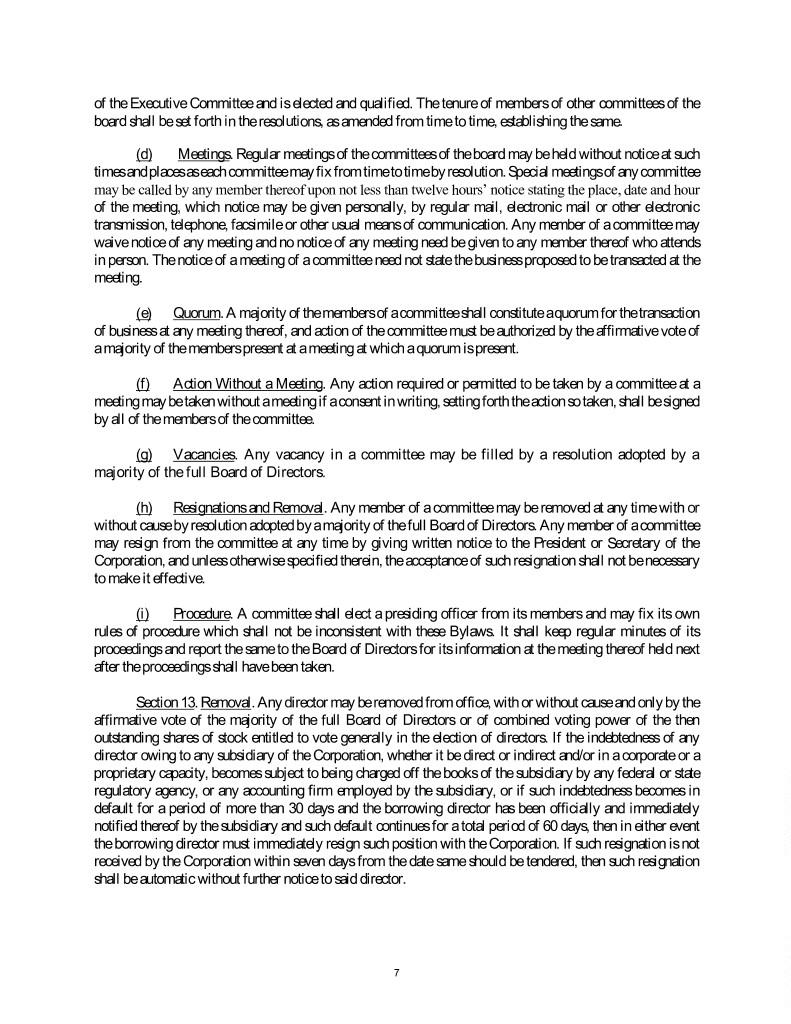
of the Executive Committee and is elected and qualified. The tenure of members of other committees of the board shall be set forth in the resolutions, as amended from time to time, establishing the same. (d) Meetings. Regular meetings of the committees of the board may be held without notice at such times and places as each committee may fix from time to time by resolution. Special meetings of any committee may be called by any member thereof upon not less than twelve hours’ notice stating the place, date and hour of the meeting, which notice may be given personally, by regular mail, electronic mail or other electronic transmission, telephone, facsimile or other usual means of communication. Any member of a committee may waive notice of any meeting and no notice of any meeting need be given to any member thereof who attends in person. The notice of a meeting of a committee need not state the business proposed to be transacted at the meeting. (e) Quorum. A majority of the members of a committee shall constitute a quorum for the transaction of business at any meeting thereof, and action of the committee must be authorized by the affirmative vote of a majority of the members present at a meeting at which a quorum is present. (f) Action Without a Meeting. Any action required or permitted to be taken by a committee at a meeting may be taken without a meeting if a consent in writing, setting forth the action so taken, shall be signed by all of the members of the committee. (g) Vacancies. Any vacancy in a committee may be filled by a resolution adopted by a majority of the full Board of Directors. (h) Resignations and Removal. Any member of a committee may be removed at any time with or without cause by resolution adopted by a majority of the full Board of Directors. Any member of a committee may resign from the committee at any time by giving written notice to the President or Secretary of the Corporation, and unless otherwise specified therein, the acceptance of such resignation shall not be necessary to make it effective. (i) Procedure. A committee shall elect a presiding officer from its members and may fix its own rules of procedure which shall not be inconsistent with these Bylaws. It shall keep regular minutes of its proceedings and report the same to the Board of Directors for its information at the meeting thereof held next after the proceedings shall have been taken. Section 13. Removal. Any director may be removed from office, with or without cause and only by the affirmative vote of the majority of the full Board of Directors or of combined voting power of the then outstanding shares of stock entitled to vote generally in the election of directors. If the indebtedness of any director owing to any subsidiary of the Corporation, whether it be direct or indirect and/or in a corporate or a proprietary capacity, becomes subject to being charged off the books of the subsidiary by any federal or state regulatory agency, or any accounting firm employed by the subsidiary, or if such indebtedness becomes in default for a period of more than 30 days and the borrowing director has been officially and immediately notified thereof by the subsidiary and such default continues for a total period of 60 days, then in either event the borrowing director must immediately resign such position with the Corporation. If such resignation is not received by the Corporation within seven days from the date same should be tendered, then such resignation shall be automatic without further notice to said director. 7
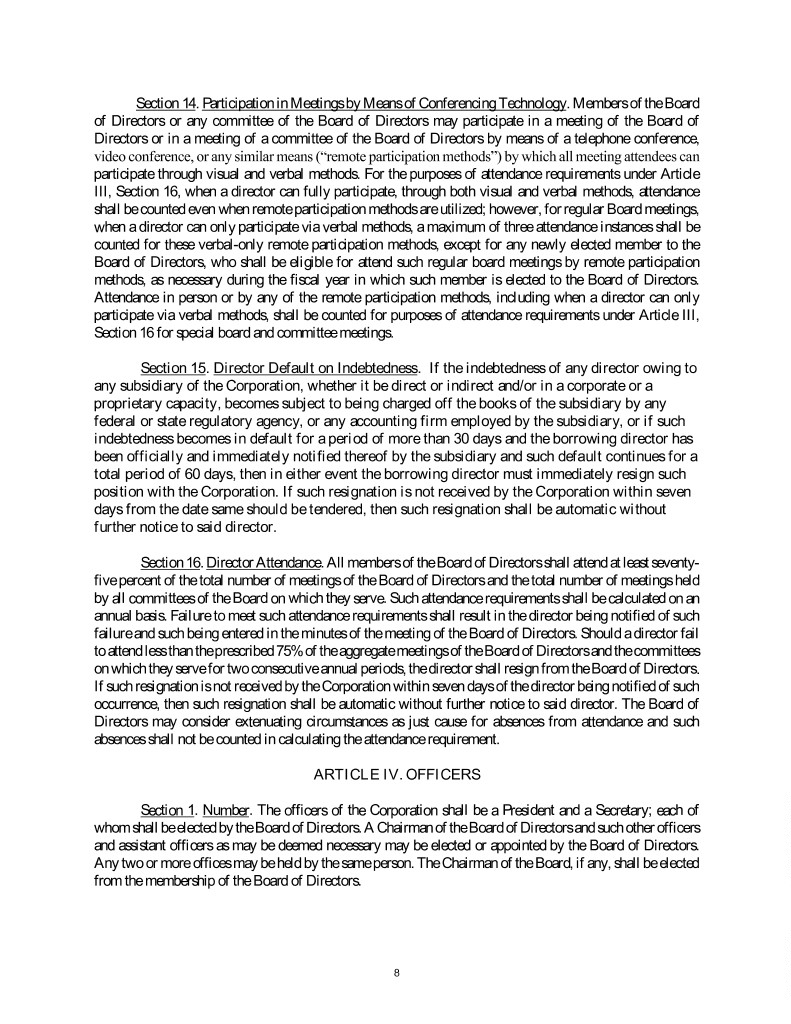
Section 14. Participation in Meetings by Means of Conferencing Technology. Members of the Board of Directors or any committee of the Board of Directors may participate in a meeting of the Board of Directors or in a meeting of a committee of the Board of Directors by means of a telephone conference, video conference, or any similar means (“remote participation methods”) by which all meeting attendees can participate through visual and verbal methods. For the purposes of attendance requirements under Article III, Section 16, when a director can fully participate, through both visual and verbal methods, attendance shall be counted even when remote participation methods are utilized; however, for regular Board meetings, when a director can only participate via verbal methods, a maximum of three attendance instances shall be counted for these verbal-only remote participation methods, except for any newly elected member to the Board of Directors, who shall be eligible for attend such regular board meetings by remote participation methods, as necessary during the fiscal year in which such member is elected to the Board of Directors. Attendance in person or by any of the remote participation methods, including when a director can only participate via verbal methods, shall be counted for purposes of attendance requirements under Article III, Section 16 for special board and committee meetings. Section 15. Director Default on Indebtedness. If the indebtedness of any director owing to any subsidiary of the Corporation, whether it be direct or indirect and/or in a corporate or a proprietary capacity, becomes subject to being charged off the books of the subsidiary by any federal or state regulatory agency, or any accounting firm employed by the subsidiary, or if such indebtedness becomes in default for a period of more than 30 days and the borrowing director has been officially and immediately notified thereof by the subsidiary and such default continues for a total period of 60 days, then in either event the borrowing director must immediately resign such position with the Corporation. If such resignation is not received by the Corporation within seven days from the date same should be tendered, then such resignation shall be automatic without further notice to said director. Section 16. Director Attendance. All members of the Board of Directors shall attend at least seventy- five percent of the total number of meetings of the Board of Directors and the total number of meetings held by all committees of the Board on which they serve. Such attendance requirements shall be calculated on an annual basis. Failure to meet such attendance requirements shall result in the director being notified of such failure and such being entered in the minutes of the meeting of the Board of Directors. Should a director fail to attend less than the prescribed 75% of the aggregate meetings of the Board of Directors and the committees on which they serve for two consecutive annual periods, the director shall resign from the Board of Directors. If such resignation is not received by the Corporation within seven days of the director being notified of such occurrence, then such resignation shall be automatic without further notice to said director. The Board of Directors may consider extenuating circumstances as just cause for absences from attendance and such absences shall not be counted in calculating the attendance requirement. ARTICLE IV. OFFICERS Section 1. Number. The officers of the Corporation shall be a President and a Secretary; each of whom shall be elected by the Board of Directors. A Chairman of the Board of Directors and such other officers and assistant officers as may be deemed necessary may be elected or appointed by the Board of Directors. Any two or more offices may be held by the same person. The Chairman of the Board, if any, shall be elected from the membership of the Board of Directors. 8
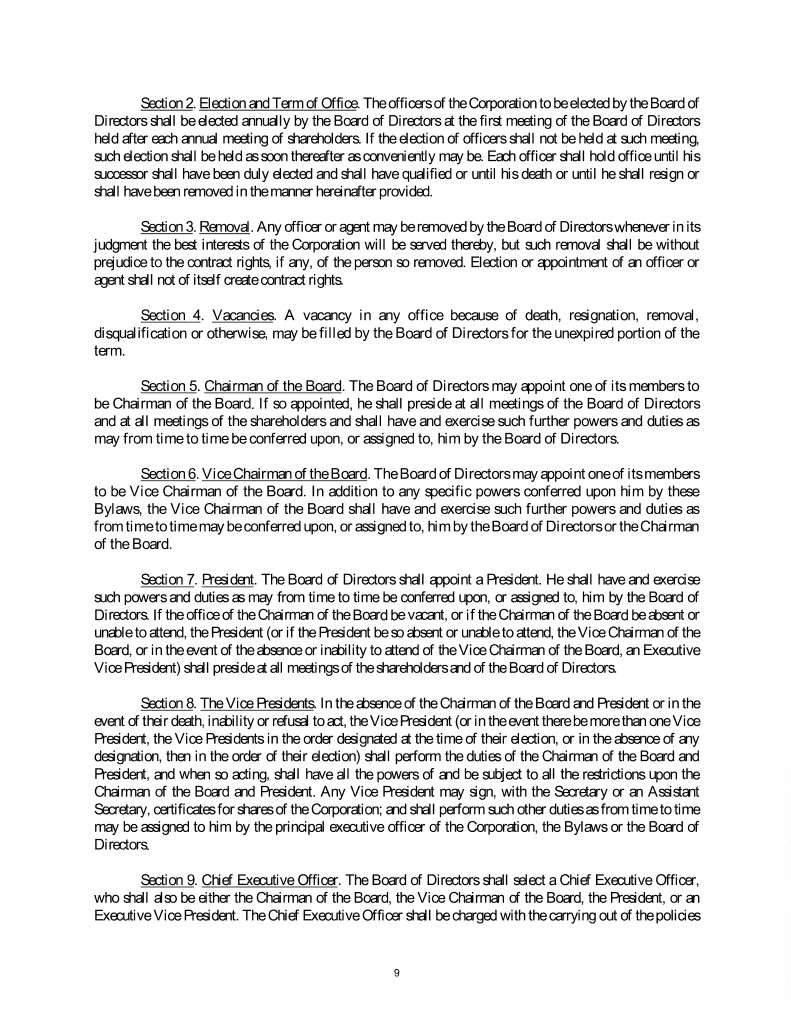
Section 2. Election and Term of Office. The officers of the Corporation to be elected by the Board of Directors shall be elected annually by the Board of Directors at the first meeting of the Board of Directors held after each annual meeting of shareholders. If the election of officers shall not be held at such meeting, such election shall be held as soon thereafter as conveniently may be. Each officer shall hold office until his successor shall have been duly elected and shall have qualified or until his death or until he shall resign or shall have been removed in the manner hereinafter provided. Section 3. Removal. Any officer or agent may be removed by the Board of Directors whenever in its judgment the best interests of the Corporation will be served thereby, but such removal shall be without prejudice to the contract rights, if any, of the person so removed. Election or appointment of an officer or agent shall not of itself create contract rights. Section 4. Vacancies. A vacancy in any office because of death, resignation, removal, disqualification or otherwise, may be filled by the Board of Directors for the unexpired portion of the term. Section 5. Chairman of the Board. The Board of Directors may appoint one of its members to be Chairman of the Board. If so appointed, he shall preside at all meetings of the Board of Directors and at all meetings of the shareholders and shall have and exercise such further powers and duties as may from time to time be conferred upon, or assigned to, him by the Board of Directors. Section 6. Vice Chairman of the Board. The Board of Directors may appoint one of its members to be Vice Chairman of the Board. In addition to any specific powers conferred upon him by these Bylaws, the Vice Chairman of the Board shall have and exercise such further powers and duties as from time to time may be conferred upon, or assigned to, him by the Board of Directors or the Chairman of the Board. Section 7. President. The Board of Directors shall appoint a President. He shall have and exercise such powers and duties as may from time to time be conferred upon, or assigned to, him by the Board of Directors. If the office of the Chairman of the Board be vacant, or if the Chairman of the Board be absent or unable to attend, the President (or if the President be so absent or unable to attend, the Vice Chairman of the Board, or in the event of the absence or inability to attend of the Vice Chairman of the Board, an Executive Vice President) shall preside at all meetings of the shareholders and of the Board of Directors. Section 8. The Vice Presidents. In the absence of the Chairman of the Board and President or in the event of their death, inability or refusal to act, the Vice President (or in the event there be more than one Vice President, the Vice Presidents in the order designated at the time of their election, or in the absence of any designation, then in the order of their election) shall perform the duties of the Chairman of the Board and President, and when so acting, shall have all the powers of and be subject to all the restrictions upon the Chairman of the Board and President. Any Vice President may sign, with the Secretary or an Assistant Secretary, certificates for shares of the Corporation; and shall perform such other duties as from time to time may be assigned to him by the principal executive officer of the Corporation, the Bylaws or the Board of Directors. Section 9. Chief Executive Officer. The Board of Directors shall select a Chief Executive Officer, who shall also be either the Chairman of the Board, the Vice Chairman of the Board, the President, or an Executive Vice President. The Chief Executive Officer shall be charged with the carrying out of the policies 9
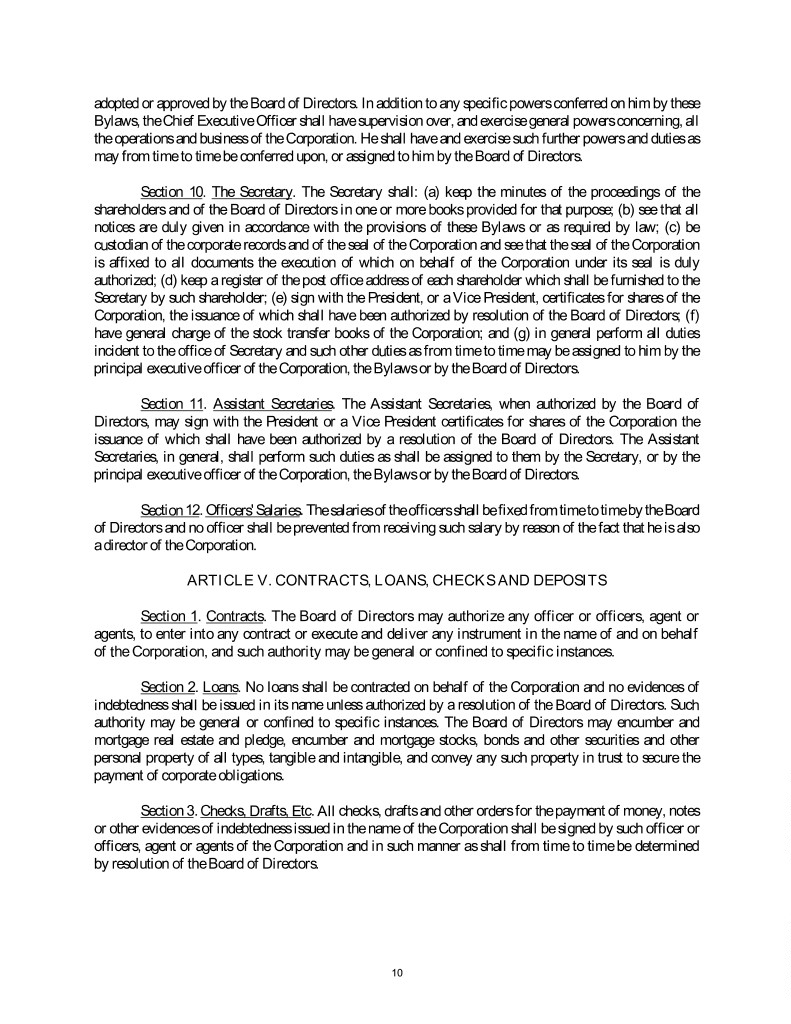
adopted or approved by the Board of Directors. In addition to any specific powers conferred on him by these Bylaws, the Chief Executive Officer shall have supervision over, and exercise general powers concerning, all the operations and business of the Corporation. He shall have and exercise such further powers and duties as may from time to time be conferred upon, or assigned to him by the Board of Directors. Section 10. The Secretary. The Secretary shall: (a) keep the minutes of the proceedings of the shareholders and of the Board of Directors in one or more books provided for that purpose; (b) see that all notices are duly given in accordance with the provisions of these Bylaws or as required by law; (c) be custodian of the corporate records and of the seal of the Corporation and see that the seal of the Corporation is affixed to all documents the execution of which on behalf of the Corporation under its seal is duly authorized; (d) keep a register of the post office address of each shareholder which shall be furnished to the Secretary by such shareholder; (e) sign with the President, or a Vice President, certificates for shares of the Corporation, the issuance of which shall have been authorized by resolution of the Board of Directors; (f) have general charge of the stock transfer books of the Corporation; and (g) in general perform all duties incident to the office of Secretary and such other duties as from time to time may be assigned to him by the principal executive officer of the Corporation, the Bylaws or by the Board of Directors. Section 11. Assistant Secretaries. The Assistant Secretaries, when authorized by the Board of Directors, may sign with the President or a Vice President certificates for shares of the Corporation the issuance of which shall have been authorized by a resolution of the Board of Directors. The Assistant Secretaries, in general, shall perform such duties as shall be assigned to them by the Secretary, or by the principal executive officer of the Corporation, the Bylaws or by the Board of Directors. Section 12. Officers' Salaries. The salaries of the officers shall be fixed from time to time by the Board of Directors and no officer shall be prevented from receiving such salary by reason of the fact that he is also a director of the Corporation. ARTICLE V. CONTRACTS, LOANS, CHECKS AND DEPOSITS Section 1. Contracts. The Board of Directors may authorize any officer or officers, agent or agents, to enter into any contract or execute and deliver any instrument in the name of and on behalf of the Corporation, and such authority may be general or confined to specific instances. Section 2. Loans. No loans shall be contracted on behalf of the Corporation and no evidences of indebtedness shall be issued in its name unless authorized by a resolution of the Board of Directors. Such authority may be general or confined to specific instances. The Board of Directors may encumber and mortgage real estate and pledge, encumber and mortgage stocks, bonds and other securities and other personal property of all types, tangible and intangible, and convey any such property in trust to secure the payment of corporate obligations. Section 3. Checks, Drafts, Etc. All checks, drafts and other orders for the payment of money, notes or other evidences of indebtedness issued in the name of the Corporation shall be signed by such officer or officers, agent or agents of the Corporation and in such manner as shall from time to time be determined by resolution of the Board of Directors. 10
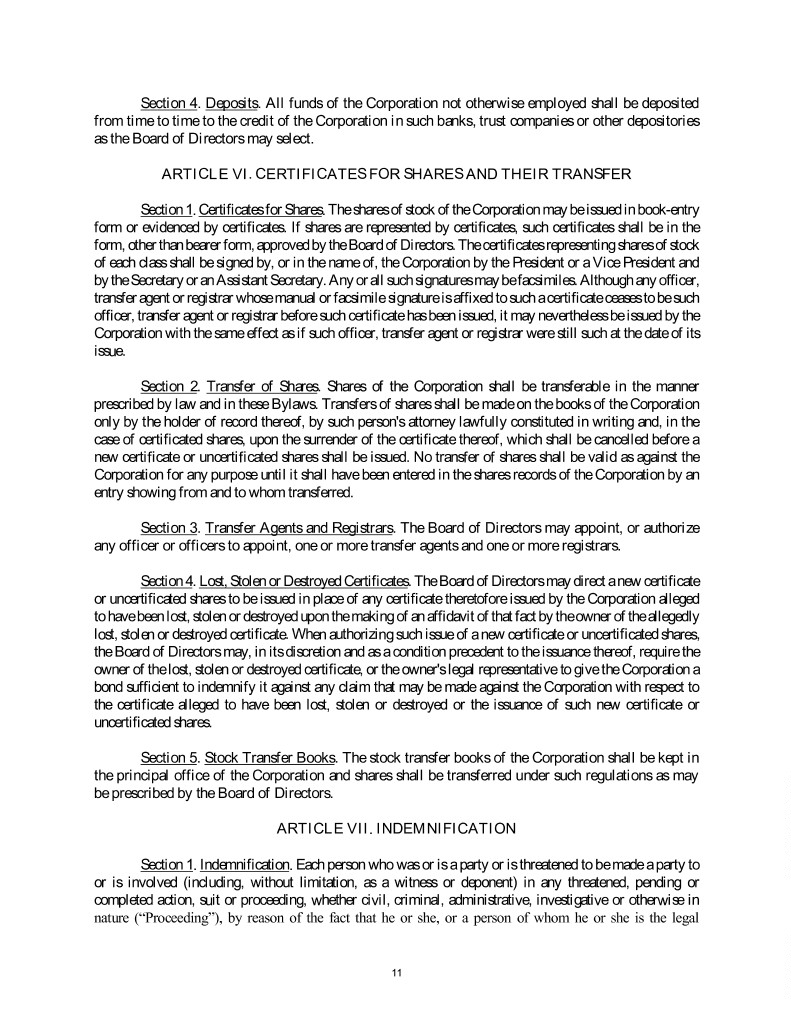
Section 4. Deposits. All funds of the Corporation not otherwise employed shall be deposited from time to time to the credit of the Corporation in such banks, trust companies or other depositories as the Board of Directors may select. ARTICLE VI. CERTIFICATES FOR SHARES AND THEIR TRANSFER Section 1. Certificates for Shares. The shares of stock of the Corporation may be issued in book-entry form or evidenced by certificates. If shares are represented by certificates, such certificates shall be in the form, other than bearer form, approved by the Board of Directors. The certificates representing shares of stock of each class shall be signed by, or in the name of, the Corporation by the President or a Vice President and by the Secretary or an Assistant Secretary. Any or all such signatures may be facsimiles. Although any officer, transfer agent or registrar whose manual or facsimile signature is affixed to such a certificate ceases to be such officer, transfer agent or registrar before such certificate has been issued, it may nevertheless be issued by the Corporation with the same effect as if such officer, transfer agent or registrar were still such at the date of its issue. Section 2. Transfer of Shares. Shares of the Corporation shall be transferable in the manner prescribed by law and in these Bylaws. Transfers of shares shall be made on the books of the Corporation only by the holder of record thereof, by such person's attorney lawfully constituted in writing and, in the case of certificated shares, upon the surrender of the certificate thereof, which shall be cancelled before a new certificate or uncertificated shares shall be issued. No transfer of shares shall be valid as against the Corporation for any purpose until it shall have been entered in the shares records of the Corporation by an entry showing from and to whom transferred. Section 3. Transfer Agents and Registrars. The Board of Directors may appoint, or authorize any officer or officers to appoint, one or more transfer agents and one or more registrars. Section 4. Lost, Stolen or Destroyed Certificates. The Board of Directors may direct a new certificate or uncertificated shares to be issued in place of any certificate theretofore issued by the Corporation alleged to have been lost, stolen or destroyed upon the making of an affidavit of that fact by the owner of the allegedly lost, stolen or destroyed certificate. When authorizing such issue of a new certificate or uncertificated shares, the Board of Directors may, in its discretion and as a condition precedent to the issuance thereof, require the owner of the lost, stolen or destroyed certificate, or the owner's legal representative to give the Corporation a bond sufficient to indemnify it against any claim that may be made against the Corporation with respect to the certificate alleged to have been lost, stolen or destroyed or the issuance of such new certificate or uncertificated shares. Section 5. Stock Transfer Books. The stock transfer books of the Corporation shall be kept in the principal office of the Corporation and shares shall be transferred under such regulations as may be prescribed by the Board of Directors. ARTICLE VII. INDEMNIFICATION Section 1. Indemnification. Each person who was or is a party or is threatened to be made a party to or is involved (including, without limitation, as a witness or deponent) in any threatened, pending or completed action, suit or proceeding, whether civil, criminal, administrative, investigative or otherwise in nature (“Proceeding”), by reason of the fact that he or she, or a person of whom he or she is the legal 11
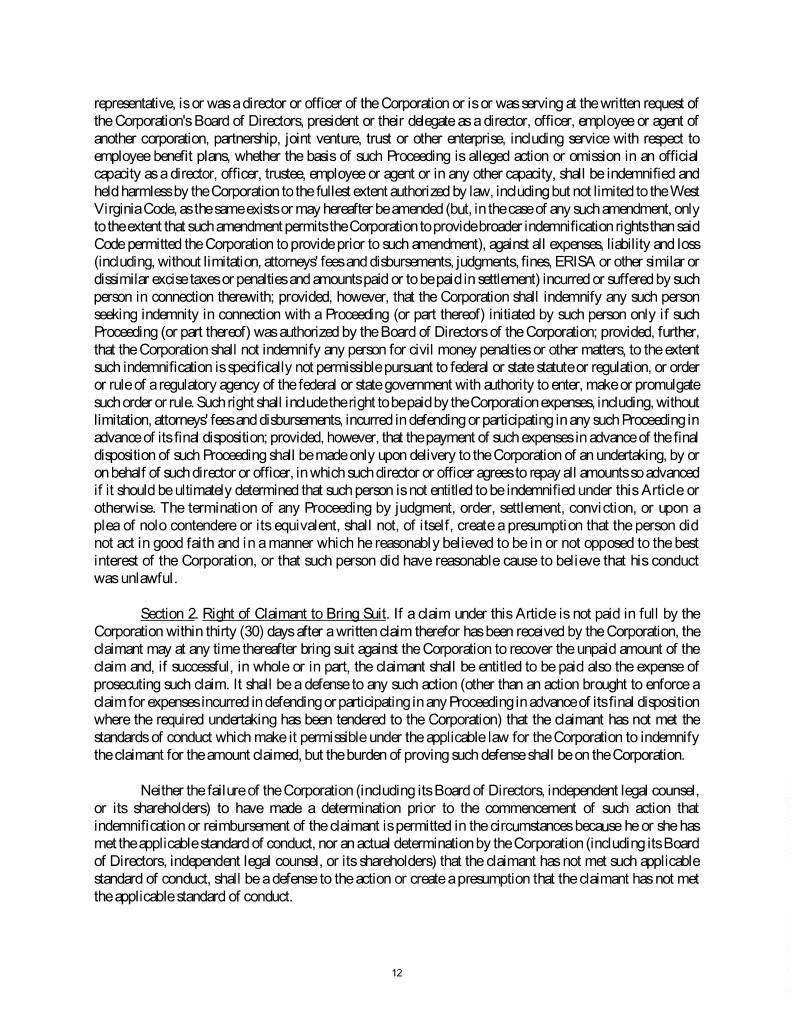
representative, is or was a director or officer of the Corporation or is or was serving at the written request of the Corporation's Board of Directors, president or their delegate as a director, officer, employee or agent of another corporation, partnership, joint venture, trust or other enterprise, including service with respect to employee benefit plans, whether the basis of such Proceeding is alleged action or omission in an official capacity as a director, officer, trustee, employee or agent or in any other capacity, shall be indemnified and held harmless by the Corporation to the fullest extent authorized by law, including but not limited to the West Virginia Code, as the same exists or may hereafter be amended (but, in the case of any such amendment, only to the extent that such amendment permits the Corporation to provide broader indemnification rights than said Code permitted the Corporation to provide prior to such amendment), against all expenses, liability and loss (including, without limitation, attorneys' fees and disbursements, judgments, fines, ERISA or other similar or dissimilar excise taxes or penalties and amounts paid or to be paid in settlement) incurred or suffered by such person in connection therewith; provided, however, that the Corporation shall indemnify any such person seeking indemnity in connection with a Proceeding (or part thereof) initiated by such person only if such Proceeding (or part thereof) was authorized by the Board of Directors of the Corporation; provided, further, that the Corporation shall not indemnify any person for civil money penalties or other matters, to the extent such indemnification is specifically not permissible pursuant to federal or state statute or regulation, or order or rule of a regulatory agency of the federal or state government with authority to enter, make or promulgate such order or rule. Such right shall include the right to be paid by the Corporation expenses, including, without limitation, attorneys' fees and disbursements, incurred in defending or participating in any such Proceeding in advance of its final disposition; provided, however, that the payment of such expenses in advance of the final disposition of such Proceeding shall be made only upon delivery to the Corporation of an undertaking, by or on behalf of such director or officer, in which such director or officer agrees to repay all amounts so advanced if it should be ultimately determined that such person is not entitled to be indemnified under this Article or otherwise. The termination of any Proceeding by judgment, order, settlement, conviction, or upon a plea of nolo contendere or its equivalent, shall not, of itself, create a presumption that the person did not act in good faith and in a manner which he reasonably believed to be in or not opposed to the best interest of the Corporation, or that such person did have reasonable cause to believe that his conduct was unlawful. Section 2. Right of Claimant to Bring Suit. If a claim under this Article is not paid in full by the Corporation within thirty (30) days after a written claim therefor has been received by the Corporation, the claimant may at any time thereafter bring suit against the Corporation to recover the unpaid amount of the claim and, if successful, in whole or in part, the claimant shall be entitled to be paid also the expense of prosecuting such claim. It shall be a defense to any such action (other than an action brought to enforce a claim for expenses incurred in defending or participating in any Proceeding in advance of its final disposition where the required undertaking has been tendered to the Corporation) that the claimant has not met the standards of conduct which make it permissible under the applicable law for the Corporation to indemnify the claimant for the amount claimed, but the burden of proving such defense shall be on the Corporation. Neither the failure of the Corporation (including its Board of Directors, independent legal counsel, or its shareholders) to have made a determination prior to the commencement of such action that indemnification or reimbursement of the claimant is permitted in the circumstances because he or she has met the applicable standard of conduct, nor an actual determination by the Corporation (including its Board of Directors, independent legal counsel, or its shareholders) that the claimant has not met such applicable standard of conduct, shall be a defense to the action or create a presumption that the claimant has not met the applicable standard of conduct. 12
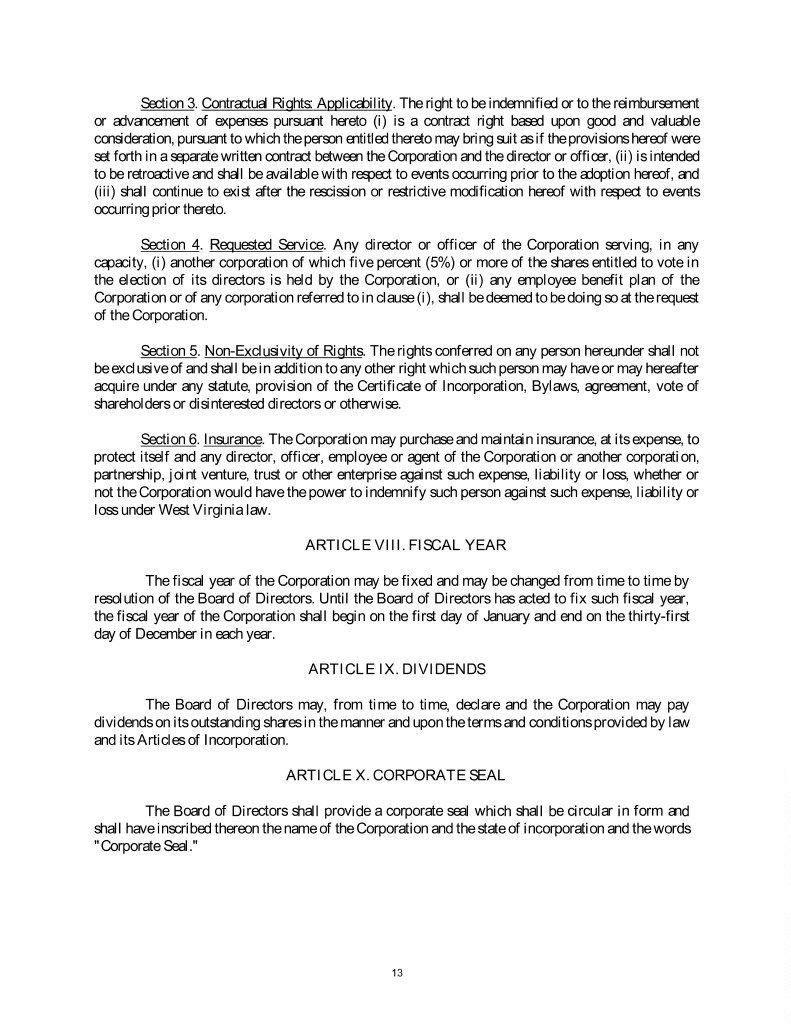
Section 3. Contractual Rights: Applicability. The right to be indemnified or to the reimbursement or advancement of expenses pursuant hereto (i) is a contract right based upon good and valuable consideration, pursuant to which the person entitled thereto may bring suit as if the provisions hereof were set forth in a separate written contract between the Corporation and the director or officer, (ii) is intended to be retroactive and shall be available with respect to events occurring prior to the adoption hereof, and (iii) shall continue to exist after the rescission or restrictive modification hereof with respect to events occurring prior thereto. Section 4. Requested Service. Any director or officer of the Corporation serving, in any capacity, (i) another corporation of which five percent (5%) or more of the shares entitled to vote in the election of its directors is held by the Corporation, or (ii) any employee benefit plan of the Corporation or of any corporation referred to in clause (i), shall be deemed to be doing so at the request of the Corporation. Section 5. Non-Exclusivity of Rights. The rights conferred on any person hereunder shall not be exclusive of and shall be in addition to any other right which such person may have or may hereafter acquire under any statute, provision of the Certificate of Incorporation, Bylaws, agreement, vote of shareholders or disinterested directors or otherwise. Section 6. Insurance. The Corporation may purchase and maintain insurance, at its expense, to protect itself and any director, officer, employee or agent of the Corporation or another corporation, partnership, joint venture, trust or other enterprise against such expense, liability or loss, whether or not the Corporation would have the power to indemnify such person against such expense, liability or loss under West Virginia law. ARTICLE VIII. FISCAL YEAR The fiscal year of the Corporation may be fixed and may be changed from time to time by resolution of the Board of Directors. Until the Board of Directors has acted to fix such fiscal year, the fiscal year of the Corporation shall begin on the first day of January and end on the thirty-first day of December in each year. ARTICLE IX. DIVIDENDS The Board of Directors may, from time to time, declare and the Corporation may pay dividends on its outstanding shares in the manner and upon the terms and conditions provided by law and its Articles of Incorporation. ARTICLE X. CORPORATE SEAL The Board of Directors shall provide a corporate seal which shall be circular in form and shall have inscribed thereon the name of the Corporation and the state of incorporation and the words "Corporate Seal." 13
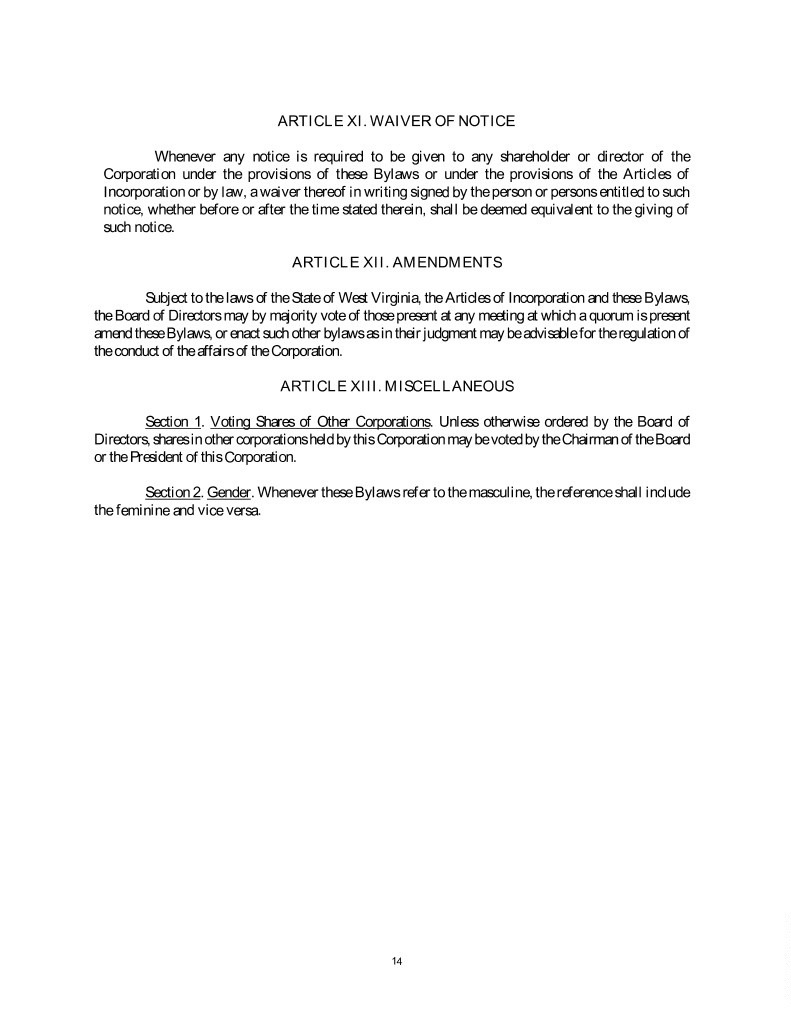
ARTICLE XI. WAIVER OF NOTICE Whenever any notice is required to be given to any shareholder or director of the Corporation under the provisions of these Bylaws or under the provisions of the Articles of Incorporation or by law, a waiver thereof in writing signed by the person or persons entitled to such notice, whether before or after the time stated therein, shall be deemed equivalent to the giving of such notice. ARTICLE XII. AMENDMENTS Subject to the laws of the State of West Virginia, the Articles of Incorporation and these Bylaws, the Board of Directors may by majority vote of those present at any meeting at which a quorum is present amend these Bylaws, or enact such other bylaws as in their judgment may be advisable for the regulation of the conduct of the affairs of the Corporation. ARTICLE XIII. MISCELLANEOUS Section 1. Voting Shares of Other Corporations. Unless otherwise ordered by the Board of Directors, shares in other corporations held by this Corporation may be voted by the Chairman of the Board or the President of this Corporation. Section 2. Gender. Whenever these Bylaws refer to the masculine, the reference shall include the feminine and vice versa. 14
